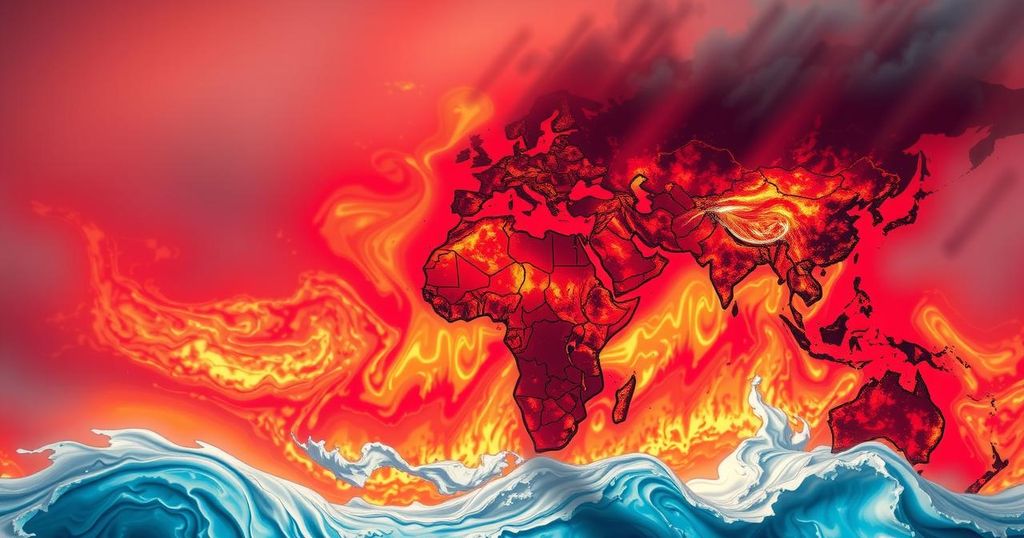2024: A Year of Escalating Climate Disasters Driven by Extreme Heat
In 2024, climate change resulted in 41 extra days of extreme heat globally, driving severe weather events such as heatwaves, floods, and droughts. The most affected regions were small island nations and developing countries, with significant health risks reported. Climate Central emphasizes the urgent necessity for emission reductions and a shift away from fossil fuels to mitigate further disasters fueled by global warming.
The year 2024 has marked a startling increase in extreme weather events, attributed to unprecedented global temperature rises. This increase encompasses severe heatwaves, droughts, wildfires, storms, and floods, which collectively led to thousands of fatalities and the displacement of millions worldwide. The influence of anthropogenic climate change has been underscored by a recent analysis from Climate Central, indicating that climate change contributed an additional 41 days of extreme heat globally in the year 2024.
Developing nations and small island states experienced the greatest repercussions from these heat events, significantly intensifying health dangers. The scope of these impacts is still being evaluated, suggesting that the true human cost of climate change is likely underreported. In many catastrophic incidents, especially in regions like the Amazon where record drought conditions led to significant biodiversity loss, climate change emerged as a more significant factor than the El Niño phenomenon.
Globally, flooding events struck various countries including Sudan, Brazil, and parts of the Southern Appalachians. Climate Central’s analysis revealed that of the 16 flood events studied, 15 were directly associated with climate change-related precipitation patterns. The insufficiencies in evacuation plans and flood management systems have aggravated the overall human toll from these disasters.
The oceans, too, have absorbed much of the excess heat, which has exacerbated the strength of storms such as Hurricane Helene and Typhoon Gaemi. Research indicates that violent storms now exhibit higher wind speeds and increased rainfall as a direct result of global warming. Furthermore, Atlantic hurricanes between the years 2019 and 2023 presented one category stronger developments than would have been likely without human-induced climate factors.
Climate Central has stated that these alarming trends underscore the critical need for an urgent reduction in greenhouse gas emissions and a transition from fossil fuel reliance to mitigate further calamities exacerbated by climate change.
The intensifying effects of climate change have emerged as a critical global issue, contributing to a surge in extreme weather conditions. According to scientific research, human activities have caused significant warming of the planet, leading to increased frequency and intensity of heatwaves, droughts, and storms. The devastating impact of these events has prompted questions about the adequacy of current mitigation strategies and the pressing need to adapt and respond to the emerging climate crisis effectively. This reality positions climate change as not merely an environmental concern, but a pressing humanitarian issue calling for immediate action from global leaders.
In conclusion, 2024’s extreme weather events serve as a stark reminder of the escalating impact of climate change, emphasizing the urgent need for action to combat its effects. The additional 41 days of extreme heat exemplify how global warming exacerbates natural disasters, particularly in vulnerable regions. With climate change emerging as a primary factor in numerous disasters, the global community must prioritize reducing emissions and transitioning towards sustainable energy practices to avert future catastrophes.
Original Source: www.energylivenews.com




Post Comment